Enhancing digital-agecommunication for corporate reputation and profitability(3)
By Goke Ilesanmi
Last week, we further examined Nigerian English features and effects on corporate reputation and profitability in the digital age. We said lack of knowledge of dictionary symbols or abbreviations is one of the features of Nigerian English. We explained that examples of these abbreviations are “n” for noun; “v” for Verb; “adv” for Adverb; “adj” for Adjective; “pron” for Pronoun, etc.
We said the abbreviation “adj” is placed against a word like “Mediocre” to show it is an adjective, but lack of knowledge of what the abbreviation “adj” means makes most Nigerians use the word as a noun by saying “You are mediocres”. We said the correct usage is “You are mediocre people”, “You are a mediocre person” or “You are mediocre..
We said lack of knowledge of dictionary symbols has also led to ignorant usage of American English words in place of British English words. We said for instance, the short form “BrE” means British English while “AmE” means “American English.”
We explained that “AmE” is written against the word “Gotten” with the “pp” symbol to show that it is the American English past participle of the verb “Get”. We said “BrE” is written against the word “Got” with a “pp” symbol to show that it is the British English past participle of Get.” We said but many Nigerians ignorantly say “I have gotten” instead of the British English version “I have got.”
We said the word “Presently” has two meanings. We explained that the first meaning is “Very soon” which has the symbol “BrE” (British English) against it. We added that the second meaning is “Now” which has the symbol “AmE” (American English) against it. We said this means it is wrong to use “Presently” to mean “Now” in British English, rather, we use “At present” or “Currently” in British English.
We said if you tell your British customer or prospect that you “presently” have some needed products in stock, you have lost business because you are ignorantly telling him or her that you will have the products very soon.
We also explained symbols or short forms such as “[C]”, “[U]”and “[C,U]” placed against nouns (represented by”n”) in the dictionary to reflect their grammatical behaviour or status. We said thus, when “[C]” is placed against a noun, it means the noun is countable; when “[U]” is used, it means the noun is uncountable and when “[C,U]” symbol is placed against a noun that has a single meaning, it means it can be used both in a countable and uncountable sense. We said when the symbol “[C,U]” is placed against one of the meanings of a noun having more than a meaning, that is, a polysemous word, it means the noun can be used either way in that situation.
We discussed overgeneralisation of rules of English halfway and said it is another feature of Nigerian English that is making us to commit errors daily. We said for instance, because the verb “Realise” has the noun “Realisation”, we often overgeneralise the rule by wrongly thinking the noun from the verb “Vandalise” is “Vandalisation” instead of the correct noun “Vandalism”.
Nigerian English features and digital-age effects
Overgeneralisation of rules of English:…We also say “She is yet to go there” instead of “She has yet to go there.” Longman Dictionary of Contemporary English illustrates this thus, “I have yet to hear Ray’s version of what happened” and “The bank has yet to respond to our letter”. Note that if a main verb like “Hear” or “Respond” is not involved, any of these two sentences cannot be not used this way. So it is correct to say “He is not yet around”, because “Around” is not a verb. In Nigerian English, we equally wrongly say “I know fully well” instead of “I know full well.”
Most Nigerians also interpret the expression “No love lost” to mean that the love between two people is intact. This idiom actually means that two people involved hate each other, that the love does not exist in the first place not to talk of it getting lost. One of the ex-Super Eagles players was asked about his relationship with another ex-Super Eagles player on a radio sports programme some years ago, he replied that that their relationship was intact and also used the idiom “No love lost” to emphasise it. What a self-contradiction!
In the same vein, the expression “Play the Devil’s advocate” is misinterpreted in Nigerian English. The dictionary meaning is: “to pretend to disagree with somebody in order to have good discussion about something”. But in Nigerian English, it is wrongly used to mean that somebody is defending an offender, like an advocate or lawyer.
Additional examples
Most speakers of Nigerian English wrongly say “The president has commissioned the new road” instead of “The president has inaugurated the new road”; “He always speaks big grammar” instead of “He always uses high-sounding words or vocabulary”; “I am a staff of this organisation” instead of “I am a member of staff of this organisation”. In Nigerian English, it is common to hear the wrong expression “You that is not serious” while referring to one person, instead of “You that are not serious.”
Speakers of Nigerian English wrongly say “I that is not afraid” instead of “I that am not afraid”; “Night vigil” instead of “Vigil”; “Wake-keeping” or “Wake-keep” instead of the correct version “Wake”. It is also common to hear “Doctorate degree” instead of the correct version “Doctorate” or “Doctoral degree”; “Electioneering campaign” instead of “Electioneering”. Speakers of Nigerian English wrongly say “We boast of good staff” instead of the correct version “We boast good staff”; “The new manager will resume tomorrow” instead of “The new manager will assume duties tomorrow.”
Last set of examples
They also wrongly say “I have scaled through” instead of “I have sailed through”; “He is matured” instead of “He is mature”; “It seems as if” instead of “It seems that”; “That your friend” instead of “That friend of yours”; “It is pepperish” instead of “It is peppery”; “Grinded pepper” instead of “Ground pepper”; “Binded copy” instead of “Bound copy”. Most speakers of Nigerian English also wrongly say “White elephant projects” instead of “White elephants”; “In the company premises” instead of “On the company premises”; “In the bus” instead of “On the bus”. They wrongly say “Next week Tuesday” instead of “Tuesday Next week”; “Next year October” instead of “October Next year.”
English Language has become an instrument of gauging one’s height on the socio-intellectual ladder. It is therefore necessary that individuals and corporate organisations avoid use of Nigerian English because it easily leads to communication breakdown, erodes global corporate reputation, negatively affects business or career prospects and profitability in the international community, especially in this digital age.
To be continued
GOKE ILESANMI (FIMC, CMC), CEO of Gokmar Communication Consulting, is an International Platinum Columnist, Professional Public Speaker, Career Mgt Coach and Certified Mgt Consultant. He is also a Book Reviewer, Biographer and Editorial Consultant.
Tel: 08055068773; 08187499425
Email: gokeiles2010@gmail.com
Website: www.gokeilesanmi.com.ng




